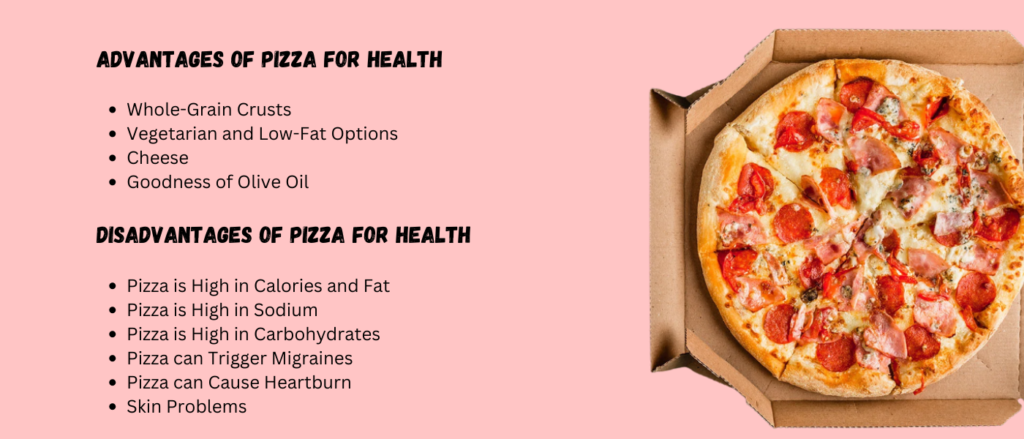Pizza has been around for centuries and is one of the most popular foods in the world. Though it is typically associated with Italian cuisine, pizza originates in ancient Greece.
The word “pizza” first appears in Latin from the southern Italian town of Gaeta in the 9th century AD. The modern pizza as we know it was invented in Naples, Italy, in the late 18th century.
Pizza was initially made with a bread-like dough and topped with vegetables and cheeses. Today, countless variations with different toppings and crusts come in pizza packaging boxes to entertain food lovers.
Pizza is an unhealthy food; however, pizza can be part of a healthy diet if it is eaten in moderation and with healthy toppings.
A slice of pizza has about 250 calories, 10 grams of fat, and 600 milligrams of sodium. This is not excessive calories, fat, or sodium if pizza is eaten in moderation. In addition, a slice of pizza can be a good source of protein and calcium. Pizza also has several vitamins and minerals, including vitamins A, C, and iron.
The main disadvantage of pizza for health is that it is often high in calories, fat, and sodium. Pizza can lead to weight gain if it is not eaten in moderation. Pizza is also often high in sugar and refined carbohydrates, contributing to diabetes and other health problems.

Advantages of Pizza for Health
Pizza is only sometimes thought of as a healthy food. However, it can be a part of a healthy diet. Pizza has some nutrients that are important for good health.
Whole-Grain Crusts: Pizza crusts made with whole grains can provide a good source of fiber.
Vegetarian and Low-Fat Options: Pizza doesn’t have to be high in fat. There are many vegetarian and low-fat options available.
Tomatoes are a good source of lycopene, an antioxidant that may help protect against some cancers.
Cheese: It is a good source of calcium and other nutrients.
Other Toppings: Pizza can be topped with various vegetables, adding vitamins, minerals, and fiber to your diet.
Pizza can be part of a healthy diet if it is made with whole-grain crusts, low-fat cheese, and healthy toppings.
Disadvantages of Pizza for Health
Pizza is one of the most popular foods in the world, enjoyed by people of all ages. It is typically made with a wheat-flour-based dough, topped with tomato sauce, cheese, and various toppings, and then baked in an oven.
While pizza can be a nutritious food, it can also be detrimental to your health if consumed excessively. Here are some of the disadvantages of pizza for health:
Pizza is High in Calories and Fat
A large pizza can easily contain over 1,000 calories and 50 grams of fat. So if you are trying to lose or maintain a healthy weight, you should limit your pizza intake.
Pizza is High in Sodium
Pizza is also high in sodium, raising your blood pressure and increasing your risk of heart disease and stroke. If you are on a low-sodium diet, you should avoid pizza or limit your intake.
Pizza is High in Carbohydrates
Pizza is made with wheat flour-based dough, which is high in carbohydrates. Therefore, if you are trying to control your blood sugar levels or are on a low-carbohydrate diet, you should limit your pizza intake.
Pizza can Trigger Migraines
For some people, eating pizza can trigger migraines. If you are susceptible to migraines, you should avoid eating pizza or limit your intake.
Pizza can Cause Heartburn
Pizza can cause heartburn for some people. If you are prone to heartburn, you should avoid eating pizza or limit your intake.
Pizza can Make You Feel Bloated
Pizza can make you feel bloated due to the high sodium content and the wheat-flour-based dough. If you are susceptible to bloating, you should avoid eating pizza or limit your intake.
Pizza can Cause Indigestion
Pizza can cause indigestion in some people. If you are prone to indigestion, you should avoid eating pizza or limit your intake.
Pizza can Trigger an Asthma Attack
For some people with asthma, eating pizza can trigger an asthma attack. So if you have asthma, you should avoid eating pizza or limit your intake.
Pizza can Make You Drowsy
Eating pizza can make you tired due to the high carbohydrate content. If you are trying to stay awake, you should avoid eating pizza.
Pizza can Lead to Weight Gain
Pizza is high in calories and fat, which can lead to weight gain if consumed in excess. Therefore, if you are trying to lose or maintain a healthy weight, you should limit your pizza intake.